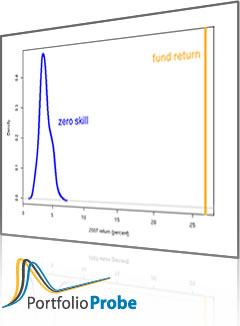Follow us using:
Newsletter Sign-up
Tag Archives: volatility
What is volatility?
Some facts and some speculation. Definition Volatility is the annualized standard deviation of returns — it is often expressed in percent. A volatility of 20 means that there is about a one-third probability that an asset’s price a year from now will have fallen or risen by more than 20% from its present value. In … Continue reading
Stock-picking opportunity and the ratio of variabilities
How good is the current opportunity to pick stocks relative to the past? Idea The more stocks act differently from each other relative to how volatile they are, the more opportunity there is to benefit by selecting stocks. This post looks at a particular way of investigating that idea. Data Daily (log) returns of 442 … Continue reading
Posted in Quant finance, R language
Tagged opportunity ratio, S&P 500, stock-picking opportunity, volatility
6 Comments
Volatility from daily or monthly: garch evidence
Should you use daily or monthly returns to estimate volatility? Does garch explain why volatility estimated with daily data tends to be bigger than if it is estimated with monthly data? Previously There are a number of previous posts — with the variance compression tag — that discuss the phenomenon of volatility estimated with daily … Continue reading
Posted in Quant finance, R language
Tagged garch simulation, variance compression, volatility
6 Comments
There’s news and there’s news
Two recent posts included the word “news”, but in different senses. Events “News” in the sense of reports on events was discussed in “News analytics”. We can think of this as an approximation to objective reality. Market moves The post “Volatility estimation and time-adjusted returns” used “news” in the sense of “that which moves market … Continue reading
Volatility estimation and time-adjusted returns
Do non-trading days explain the mystery of volatility estimation? Previously The post “The volatility mystery continues” showed that volatility estimated with daily data tends to be larger (in recent years) than when estimated with lower frequency returns. Time adjusting One of the comments — from Joseph Wilson — was that there is a problem with … Continue reading
Posted in Quant finance, R language
Tagged S&P 500, time-adjusted returns, variance compression, volatility
Leave a comment
The volatility mystery continues
How do volatility estimates based on monthly versus daily returns differ? Previously The post “The mystery of volatility estimates from daily versus monthly returns” and its offspring “Another look at autocorrelation in the S&P 500” discussed what appears to be an anomaly in the estimation of volatility from daily versus monthly data. In recent times … Continue reading
Posted in Quant finance, R language
Tagged autocorrelation, S&P 500, variance compression, volatility
13 Comments
The mystery of volatility estimates from daily versus monthly returns
What drives the estimates apart? Previously A post by Investment Performance Guy prompted “Variability of volatility estimates from daily data”. In my comments to the original post I suggested that using daily data to estimate volatility would be equivalent to using monthly data except with less variability. Dave, the Investment Performance Guy, proposed the exquisitely … Continue reading
Posted in Quant finance, R language
Tagged annualize, autocorrelation, S&P 500, variance compression, volatility
18 Comments
Variability of volatility estimates from daily returns
Investment Performance Guy has a post “Periodicity of risk statistcs (and other measures)” in which it is wondered how valid volatility estimates are from a month of daily returns. Here is a quick look. Figure 1 shows the variability (and a 95% confidence interval (gold lines) from a bootstrap) of the volatility estimate (black line) … Continue reading
